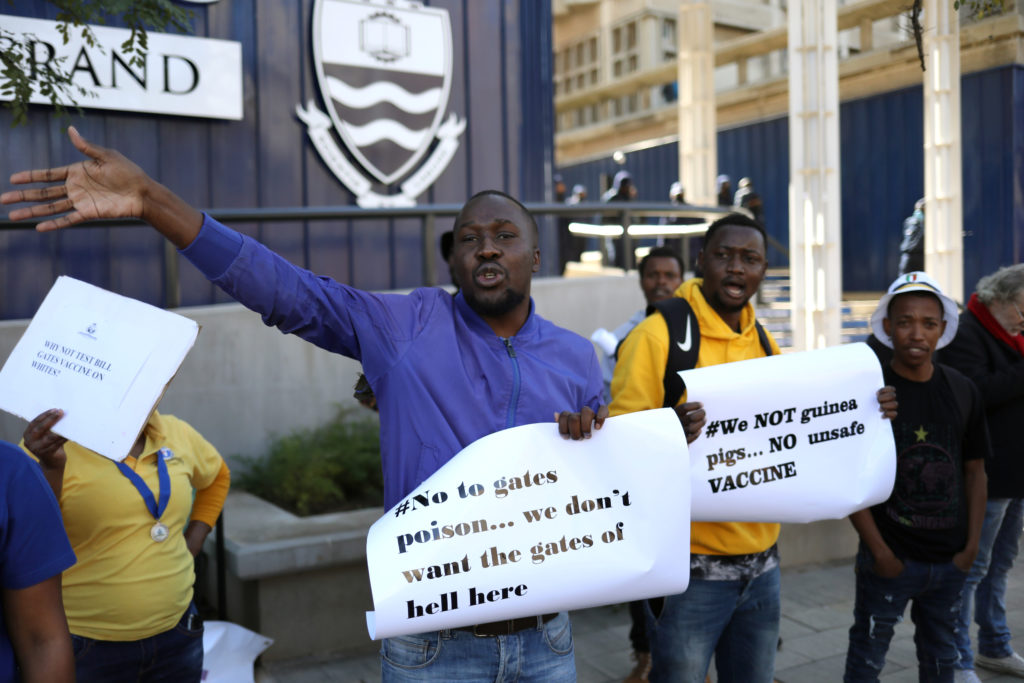
This week US President Biden said the #COVID19 pandemic is over.
He did so almost exactly a year since world leaders committed to ensuring 70% of the world’s population got vaccinated against #COVID19.
It failed dismally.
What went wrong?
He did so almost exactly a year since world leaders committed to ensuring 70% of the world’s population got vaccinated against #COVID19.
It failed dismally.
What went wrong?

First a bit of background:
At last year's UN week, Joe Biden gathered government leaders who recognized the gross inequities in vaccine distribution between rich and poor countries.
#UNGA #UNGA77
At last year's UN week, Joe Biden gathered government leaders who recognized the gross inequities in vaccine distribution between rich and poor countries.
#UNGA #UNGA77

Activists like members of @ONECampaign @GlblCtzn and @PandemicAction were delighted that leaders were finally paying attention.
At the time about 60% of the population of rich countries had been fully vaccinated.
A shocking 1.4% of poor countries had.
At the time about 60% of the population of rich countries had been fully vaccinated.
A shocking 1.4% of poor countries had.

The leaders committed that every region of the world would reach 70% vaccination by…right about now.
whitehouse.gov/briefing-room/…
whitehouse.gov/briefing-room/…
Fast forward to the deadline (this week) and where are we?
👉62.5% of the world’s population has been fully vaccinated.
👉74.7% in high-income countries
👉77.7% in upper middle-income
👉56.3% in lower middle income
👉18.7% in low-income.
one.org/africa/issues/…
👉62.5% of the world’s population has been fully vaccinated.
👉74.7% in high-income countries
👉77.7% in upper middle-income
👉56.3% in lower middle income
👉18.7% in low-income.
one.org/africa/issues/…
Why are low-income countries 51% off target?
Three reasons:
1⃣ When there was a lot of attention on the pandemic, rich countries had bought up almost all the supply of western vaccines.
Three reasons:
1⃣ When there was a lot of attention on the pandemic, rich countries had bought up almost all the supply of western vaccines.
Africa which imports 99% of its vaccines, was left dependent on COVAX - which in-turn procured most of its doses for Africa from India’s Serum Institute.
When India had a horrific COVID-19 wave and banned vaccine exports, Africa was left in the cold for months.
When India had a horrific COVID-19 wave and banned vaccine exports, Africa was left in the cold for months.
The delay in vaccine distribution suppressed demand as did vaccine misinformation in part driven by Russia and China. 

2⃣COVID cases and deaths were less prominent in Africa.
There are a number of theories - less reliable data collection, a younger population etc.
Meanwhile, Africa was hit much harder by the economic effects of COVID - people had other things to worry about.
There are a number of theories - less reliable data collection, a younger population etc.
Meanwhile, Africa was hit much harder by the economic effects of COVID - people had other things to worry about.
3⃣ The capacity to roll out vaccines - esp the mRNA vaccines that required ultra-cold chain storage was limited.
So when Rich countries finally had a surplus and scaled up their vaccine donations, in many countries, there was neither the capacity or demand for them.
So when Rich countries finally had a surplus and scaled up their vaccine donations, in many countries, there was neither the capacity or demand for them.

Now attention on the pandemic is waning.
Though while Biden said it’s over, not everyone agrees.
Here’s the head of the European Medicine Agency. politico.eu/article/eu-dru…
Though while Biden said it’s over, not everyone agrees.
Here’s the head of the European Medicine Agency. politico.eu/article/eu-dru…
It’s quite possible that we’ll see further waves in the winter - though it seems that the severity of the illness has diminished from the early days of #COVID19. Thankfully.
But what can we learn from the failure to mount a global response to a pandemic that killed roughly 18 million people and destroyed trillions in economic value?
Well, African countries have concluded that they can’t rely on the west in times of crisis and need to build their own Pharma sector.
one.org/africa/issues/…
one.org/africa/issues/…
For health campaigners - we learned again that commitments without follow-through don’t mean very much.
While there was a high-level goal, it was not followed by a massive financing scale-up and a military style operation to get the job done.
While there was a high-level goal, it was not followed by a massive financing scale-up and a military style operation to get the job done.
The @IMFNews estimated it would cost $50bn for a meaningful response to COVID19 globally.
That money never materialized.
Western leaders were simply distracted
African leaders were more focused on the economy and cost of living issues.
That money never materialized.
Western leaders were simply distracted
African leaders were more focused on the economy and cost of living issues.
We do however have some success stories to learn from.
A concerted effort to tackle the AIDS crisis has more than halved deaths from the disease saving 44 million lives.
A concerted effort to tackle the AIDS crisis has more than halved deaths from the disease saving 44 million lives.

This week, governments committed $14.25bn to continue this fight against AIDS, TB, and Malaria.
Short of its $18bn target but still significant resources.
A story that tells us what can be achieved when governments, NGOs and companies act with urgency and determination.
Short of its $18bn target but still significant resources.
A story that tells us what can be achieved when governments, NGOs and companies act with urgency and determination.
If you liked this signup: @ONEAftershocks one.org/aftershocks
And follow my brilliant @ONECampaign colleagues @Sara_Harcourt @hurrayforfacts @micaela_iveson @Ottenvos @amydodd80 @jriver_a @_mmhenry @lpicci96 @GayleSmith @Tom_at_ONE @HMATimCole @szmakka @katecritchley @romilly_one @najatvb @LisTWallace @benjdesgachons @DrumJamie @malemayehou
• • •
Missing some Tweet in this thread? You can try to
force a refresh















